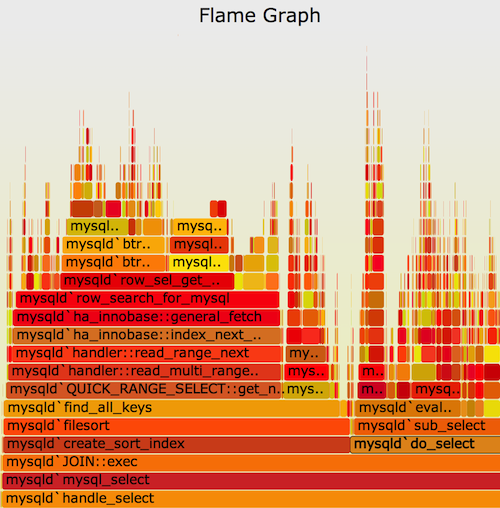前言
当我们很多时候在分析定位一个比较隐秘的问题时,我们马上能脱口而出好几种方法,查日志找异常,再细致一点的,jmap,jstack分析stack trace。但是一般如果到了分析stack trance的阶段时,说明这个很可能已经是performance的问题了。但其实很多时候,jstack这种默认的命令工具对于开发者来说还不够直观与好理解。它所展现的只是一堆的当前stack trance的展现,没有汇聚的阶段性的调用占比。jstack的结果还需要人工进行二次分析。因此,本文笔者来聊聊在这方面比较适用的一个工具:Flame Graph(火焰图)。
什么是Flame Graph
首先我们来了解火焰图的概念,以下是比较官方的解释:
This visualization of software execution is a new necessity for performance profiling and debugging.
以上译为:一种软件执行情况的形象化的反映,用于做性能profile和debug。
以下是flame graph的一张呈现效果图

后面笔者再介绍上图的含义。
Flame Graph的工作原理
在Flame Graph在呈现出整个最终结果之前,其中主要的工作并不是图形的展现,而是前面profile数据的采集。
这里数据的采集首先按照profile的类型分为以下几类:
- CPU的profile分析,那需要进行的stack trace的采集,可以借助于Linux的perf命令
- Memory的profile,那我们需要sample一些malloc类似的系统调用。
- Off-CPU的profile,那些没有消耗CPU的线程的profile,可以理解为被block住的线程。
…
以上不同类型的profile需要依赖不同的采集工具,比较常见的还是CPU profile,对于CPU的profile,它要做的其实就是进程stack trace的收集。这个收集可以按照采集总时间,采集频率来进行。
假设我们用Linux的perf命令,对某进程id为1234的进程,进行持续60s,采集频率为每秒99次的CPU使用情况要求,命令如下:
sudo perf record -F 99 -p 1234 -g --sleep 60
上述生成的stack trace全部展现出来会相当的庞大,补过perf命令可以帮助对此进行折叠,汇总统计,然后将结果文件交由Flame Graph进行最后展示。展现效果如上小节图中所示。
上述图中,y轴高度表示的stack trace的调用深度,从上往下为从child–>parent的关系,x轴宽度表示调用的频率,所以我们在观察flame Graph的时候,要观察最顶部的那些宽度比较宽的stack信息。
Flame Graph通过图形的方式能够帮助开发者迅速定位出明显消耗资源的调用,唯一可能不足的地方在于上面每个小格子的显示空间有限,没有办法显示全操作方法名,需要再次点进去进行更一步的查看。
附:Profile的页面快速执行构建工具
最近发现有些系统代码把profile行为整合到了系统代码中,做了一个ProfileServlet,然后用户可通过页面url访问能快速得到指定进程的profile结果,相当方便,代码如下(最原始来自于Hive社区),作为和本文主题的相关内容,贴出代码,后续对大家可能有所帮助
:
/*
* Licensed to the Apache Software Foundation (ASF) under one
* or more contributor license agreements. See the NOTICE file
* distributed with this work for additional information
* regarding copyright ownership. The ASF licenses this file
* to you under the Apache License, Version 2.0 (the
* "License"); you may not use this file except in compliance
* with the License. You may obtain a copy of the License at
* http://www.apache.org/licenses/LICENSE-2.0
* Unless required by applicable law or agreed to in writing, software
* distributed under the License is distributed on an "AS IS" BASIS,
* WITHOUT WARRANTIES OR CONDITIONS OF ANY KIND, either express or implied.
* See the License for the specific language governing permissions and
* limitations under the License.
*/
package org.apache.hadoop.hdds.server;
import javax.servlet.http.HttpServlet;
import javax.servlet.http.HttpServletRequest;
import javax.servlet.http.HttpServletResponse;
import java.io.File;
import java.io.FileInputStream;
import java.io.IOException;
import java.io.InputStream;
import java.lang.management.ManagementFactory;
import java.nio.file.Files;
import java.nio.file.Path;
import java.nio.file.Paths;
import java.util.ArrayList;
import java.util.List;
import java.util.concurrent.TimeUnit;
import java.util.concurrent.atomic.AtomicInteger;
import java.util.concurrent.locks.Lock;
import java.util.concurrent.locks.ReentrantLock;
import com.google.common.base.Joiner;
import org.apache.commons.io.IOUtils;
import org.slf4j.Logger;
import org.slf4j.LoggerFactory;
/**
* Servlet that runs async-profiler as web-endpoint.
* <p>
* Source: https://github.com/apache/hive/blob/master/common/src/java/org
* /apache/hive/http/ProfileServlet.java
* <p>
* Following options from async-profiler can be specified as query paramater.
* // -e event profiling event: cpu|alloc|lock|cache-misses etc.
* // -d duration run profiling for <duration> seconds (integer)
* // -i interval sampling interval in nanoseconds (long)
* // -j jstackdepth maximum Java stack depth (integer)
* // -b bufsize frame buffer size (long)
* // -t profile different threads separately
* // -s simple class names instead of FQN
* // -o fmt[,fmt...] output format:
* summary|traces|flat|collapsed|svg|tree|jfr
* // --width px SVG width pixels (integer)
* // --height px SVG frame height pixels (integer)
* // --minwidth px skip frames smaller than px (double)
* // --reverse generate stack-reversed FlameGraph / Call tree
* Example:
* - To collect 30 second CPU profile of current process (returns FlameGraph
* svg)
* curl "http://localhost:10002/prof"
* - To collect 1 minute CPU profile of current process and output in tree
* format (html)
* curl "http://localhost:10002/prof?output=tree&duration=60"
* - To collect 30 second heap allocation profile of current process (returns
* FlameGraph svg)
* curl "http://localhost:10002/prof?event=alloc"
* - To collect lock contention profile of current process (returns
* FlameGraph svg)
* curl "http://localhost:10002/prof?event=lock"
* Following event types are supported (default is 'cpu') (NOTE: not all
* OS'es support all events)
* // Perf events:
* // cpu
* // page-faults
* // context-switches
* // cycles
* // instructions
* // cache-references
* // cache-misses
* // branches
* // branch-misses
* // bus-cycles
* // L1-dcache-load-misses
* // LLC-load-misses
* // dTLB-load-misses
* // mem:breakpoint
* // trace:tracepoint
* // Java events:
* // alloc
* // lock
*/
public class ProfileServlet extends HttpServlet {
private static final long serialVersionUID = 1L;
private static final Logger LOG =
LoggerFactory.getLogger(ProfileServlet.class);
private static final String ACCESS_CONTROL_ALLOW_METHODS =
"Access-Control-Allow-Methods";
private static final String ALLOWED_METHODS = "GET";
private static final String ACCESS_CONTROL_ALLOW_ORIGIN =
"Access-Control-Allow-Origin";
private static final String CONTENT_TYPE_TEXT = "text/plain; charset=utf-8";
private static final String ASYNC_PROFILER_HOME_ENV = "ASYNC_PROFILER_HOME";
private static final String ASYNC_PROFILER_HOME_SYSTEM_PROPERTY =
"async.profiler.home";
private static final String PROFILER_SCRIPT = "/profiler.sh";
private static final int DEFAULT_DURATION_SECONDS = 10;
private static final AtomicInteger ID_GEN = new AtomicInteger(0);
static final Path OUTPUT_DIR =
Paths.get(System.getProperty("java.io.tmpdir"), "prof-output");
private Lock profilerLock = new ReentrantLock();
private Integer pid;
private String asyncProfilerHome;
private transient Process process;
public ProfileServlet() {
this.asyncProfilerHome = getAsyncProfilerHome();
this.pid = getPid();
LOG.info("Servlet process PID: {} asyncProfilerHome: {}", pid,
asyncProfilerHome);
try {
Files.createDirectories(OUTPUT_DIR);
} catch (IOException e) {
LOG.




 本文介绍了Flame Graph,一种用于性能调优的直观工具,它通过可视化的火焰图帮助开发者快速定位资源消耗。内容包括Flame Graph的概念、工作原理,以及如何利用Linux的perf命令进行CPU profile数据采集。文章还提到了整合到系统代码中的ProfileServlet,以方便快速获取profile结果。
本文介绍了Flame Graph,一种用于性能调优的直观工具,它通过可视化的火焰图帮助开发者快速定位资源消耗。内容包括Flame Graph的概念、工作原理,以及如何利用Linux的perf命令进行CPU profile数据采集。文章还提到了整合到系统代码中的ProfileServlet,以方便快速获取profile结果。
 最低0.47元/天 解锁文章
最低0.47元/天 解锁文章
















 3490
3490

 被折叠的 条评论
为什么被折叠?
被折叠的 条评论
为什么被折叠?








